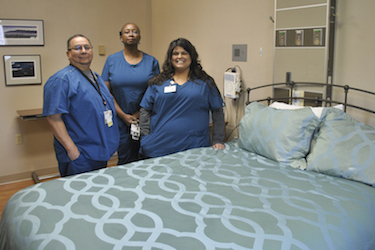 L-R: Steve Garcia, Yolanda Travers, and Rexine Sierra, Cardiopulmonary and Nuero DirectorSilver City, NM, July 1, 2019 – Gila Regional Medical Center is pleased to announce the Gila Regional Sleep Lab recently received program accreditation from the American Academy of Sleep Medicine (AASM), the gold standard for sleep labs. The Gila Regional Sleep Lab offers sleep studies in private rooms, with clinical evaluation and diagnosis of over 80 sleep disorders such as sleep apnea, central sleep apnea, circadian rhythms, periodic leg movement, parasomnias, Insomnias, degenerative neurologic, narcolepsy, cardiopulmonary disorders affecting sleep, psychiatrics that affect sleep, shift work disorder, and other medical disorders.
L-R: Steve Garcia, Yolanda Travers, and Rexine Sierra, Cardiopulmonary and Nuero DirectorSilver City, NM, July 1, 2019 – Gila Regional Medical Center is pleased to announce the Gila Regional Sleep Lab recently received program accreditation from the American Academy of Sleep Medicine (AASM), the gold standard for sleep labs. The Gila Regional Sleep Lab offers sleep studies in private rooms, with clinical evaluation and diagnosis of over 80 sleep disorders such as sleep apnea, central sleep apnea, circadian rhythms, periodic leg movement, parasomnias, Insomnias, degenerative neurologic, narcolepsy, cardiopulmonary disorders affecting sleep, psychiatrics that affect sleep, shift work disorder, and other medical disorders.
“Our Sleep lab Team has been working hard in improving the quality of sleep diagnosis and treatment we can provide to ensure our sleep patients in our community will receive the best sleep care available,” said Rexine Sierra, Cardiopulmonary and Neuro Director at Gila Regional. “Our accreditation will help us remain above the curve in sleep medicine.”
To receive accreditation, a sleep center must meet or exceed all standards for professional health care as designated by the AASM. The requirements for accreditation includes inspection of the facility and staff, testing procedures, patient contacts, and physician training. Additionally, the facility’s goals must be clearly stated and include plans for positively affecting the quality of medical care in the community it serves.
It is estimated that between 50-70 million adults suffer from some type of sleep disorder, http://www.papsociety.org/ambien-zolpidem-10-mg/. Symptoms may include: excessive daytime sleepiness, fatigue, irregular heartbeat, high blood pressure, morning headaches, difficulty concentrating, depression, snoring, gasp while sleeping, and bruxism, apnea, and restless leg syndrome.
Patients who display symptoms are encouraged to make an appointment with a physician for testing. Once you meet with your medical provider they will order an overnight pulse ox. This is a device that a patient takes home for 24 hours that measures the level of oxygen during sleep. The device is worn on one of your fingers and then returned the next morning. A report is then generated and sent to the physician’s office. The data that is collected is based on the number of times your oxygen level drops below 88% while you are asleep. The results based on that number determines if a polysomnography (sleep study) is needed.
A polysomnography (sleep Study) last about 8 hours. This study monitors your heartrate, oxygen levels, breathing, and eye and leg movement during the test. Your brain waves are also monitored at each stage of sleep that you are in. This information collected is called a diagnostics sleep test. A report that is generated is sent to the Sleep Medicine Doctor, who will generate a report to send to your Doctor.
“Here at Gila Regional we know the importance of a good night’s sleep,” said Taffy Arias, CEO at Gila Regional Medical Center. “With our state of the art sleep lab and highly trained staff we are able to help diagnose your trouble sleeping and give you the peace of mind to rest well.”